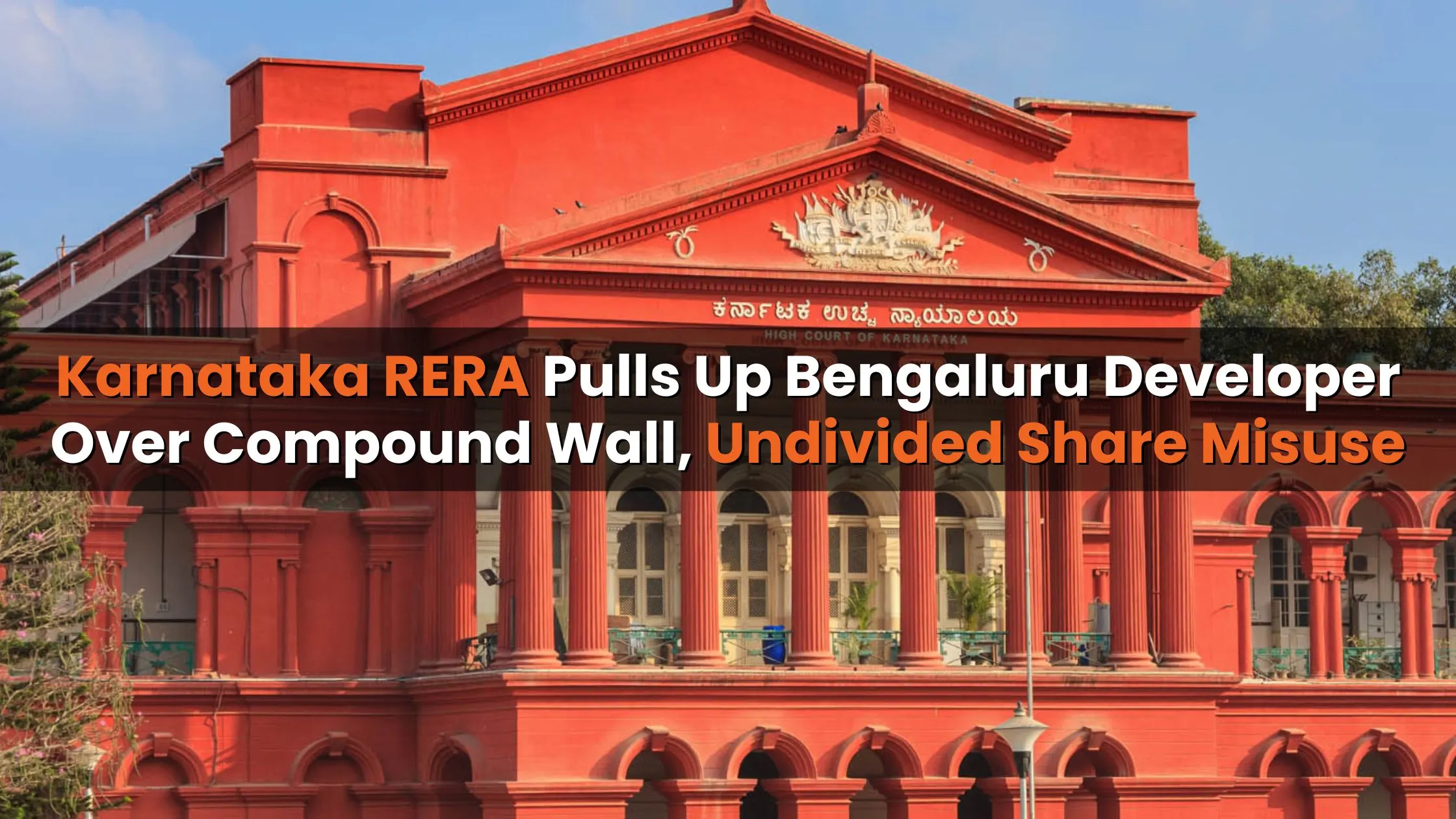Table of Content
▲
In a stern order that underscores the importance of regulatory compliance, Karnataka RERA has reprimanded Bengaluru-based developer DC Hi Rise LLP for failing to construct a compound wall and attempting to reassign a portion of the project’s Undivided Share (UDS) to a future development phase. This directive from the Karnataka Real Estate Regulatory Authority comes in response to complaints filed by over 50 homebuyers associated with the DC Capitol project located in Panathur.
Compound Wall Not Just Cosmetic, Says Karnataka RERA
According to the Karnataka RERA order, the compound wall in question was part of the original sanctioned plan and plays a vital role in defining the project's legal boundaries and ensuring security. KRERA made it clear that such features are not merely decorative but are crucial to the safety and structural integrity of the residential development.
The authority directed the developer to complete the construction of the compound wall along the southern and western boundaries within three months. It also prohibited the developer from altering or repurposing any portion of the UDS and internal driveway earmarked for Phase 1 for future project expansions unless legally permitted by two-thirds of the allottees.
Also Read: Godrej Properties Enters Raipur Market with 50-Acre Plotted Development Near Old Dhamtari Road
Undivided Share (UDS): Misuse Sparks Buyer Outrage
Homebuyers alleged that the developer attempted to convert the internal driveway part of Phase 1’s UDS—into a common access point for the upcoming Phase 2. This move raised significant concerns about the violation of their ownership rights and misuse of shared land.
For context, the Undivided Share refers to the proportion of land ownership that each flat owner holds in a housing project. Although this share isn’t physically marked, it holds legal weight in terms of property rights and common facilities. Any attempt to reallocate or repurpose it without proper approvals is considered a serious breach under the Real Estate (Regulation and Development) Act, 2016.
KRERA Reaffirms Developer's Legal Obligations
The Karnataka RERA order strongly reiterated that developers are bound by Section 14 of the RERA Act, which mandates adherence to the sanctioned layout unless at least two-thirds of the allottees provide written consent for any deviations. In this case, KRERA held that DC Hi Rise LLP had no such consent and was in violation of both legal and ethical obligations.
The authority also emphasized that shared amenities promised in the project's brochure, such as the swimming pool remain incomplete. Buyers claim that this not only breaches contractual promises but also diminishes the value and enjoyment of their property.
Karnataka RERA pulls up Bengaluru builder over compound wall, UDS violations
In its detailed ruling, Karnataka RERA clearly stated that the internal driveway and infrastructure meant for Phase 1 residents cannot be used or accessed for any future phases without obtaining necessary approvals from the competent planning authority and explicit consent from the existing allottees.
"This Authority holds that the respondent is not entitled to repurpose the UDS or driveway meant for Phase 1 allottees for any other development phase," the order read.
The decision sends a strong message to developers across Karnataka that overlooking legal responsibilities or attempting to alter project layouts post-registration will not be tolerated.
Also Read: DLF The Westpark: Premium Project Marks DLF’s Entry into Mumbai Real Estate
What This Means for Homebuyers
This case is a reminder for homebuyers in Bengaluru and across Karnataka to thoroughly scrutinize project layouts, sanctioned plans, and promised amenities before purchasing a property. With the Karnataka RERA taking a more proactive stance, homebuyers now have stronger protection against deviations that compromise their investment or living standards.
Conclusion
Karnataka RERA’s directive reinforces its role as a crucial watchdog in the state’s real estate ecosystem. By holding developers accountable for non-compliance, it ensures transparency, accountability, and trust between builders and homebuyers. For Bengaluru’s growing residential market, such enforcement is essential in maintaining integrity and safeguarding buyer rights.
Follow AquireAcers Whatsapp Channel to Stay Updated With The Latest Real Estate News



_1771577585.webp)


_1771582392.webp)
Ans 1. Karnataka RERA ordered the developer to build the compound wall as per the sanctioned plan and barred them from reusing any part of the Undivided Share or internal driveway for future phases without buyer consent.
Ans 2. The wall defines the legal boundary of Phase 1 and ensures safety. Karnataka RERA clarified it's not a cosmetic feature but a mandatory part of the project layout.
Ans 3. UDS refers to each owner's legal share in the project's land. Buyers were angry because the developer tried to use Phase 1's UDS for access to a future phase without consent.
Ans 4. Under Section 14 of the RERA Act, developers can't change a project layout without approval from two-thirds of buyers. In this case, the builder made changes without consent.
Ans 5. Buyers claimed key amenities like the swimming pool were left incomplete, which breached contractual obligations and reduced property value.
Ans 6. It highlights the importance of verifying approved plans and amenities. With RERA enforcing compliance strictly, buyers now have better protection against layout changes and project deviations.